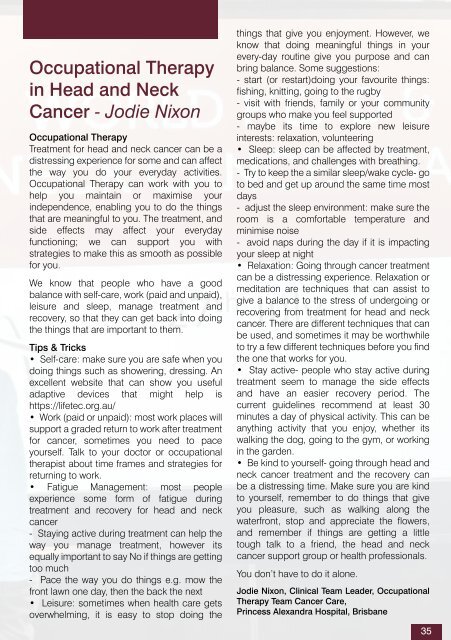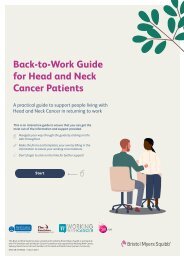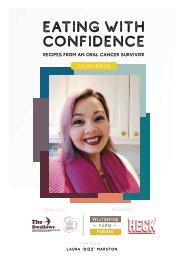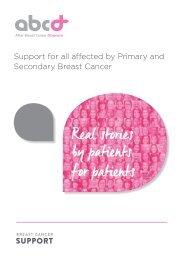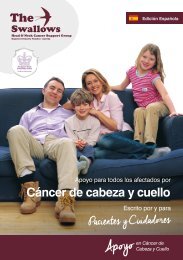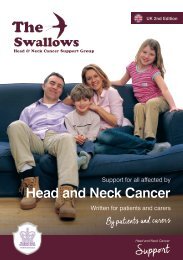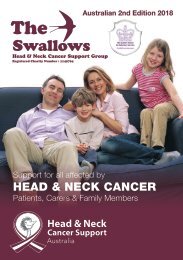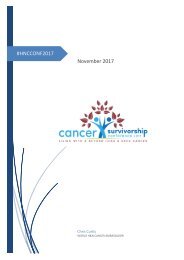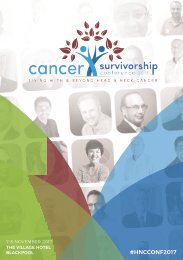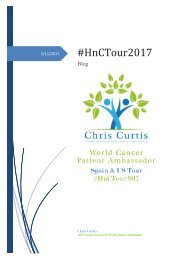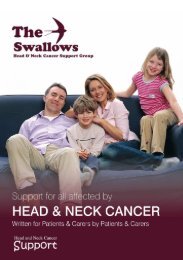The Swallows Australian Edition Magazine
You also want an ePaper? Increase the reach of your titles
YUMPU automatically turns print PDFs into web optimized ePapers that Google loves.
Occupational <strong>The</strong>rapy<br />
in Head and Neck<br />
Cancer - Jodie Nixon<br />
Occupational <strong>The</strong>rapy<br />
Treatment for head and neck cancer can be a<br />
distressing experience for some and can affect<br />
the way you do your everyday activities.<br />
Occupational <strong>The</strong>rapy can work with you to<br />
help you maintain or maximise your<br />
independence, enabling you to do the things<br />
that are meaningful to you. <strong>The</strong> treatment, and<br />
side effects may affect your everyday<br />
functioning; we can support you with<br />
strategies to make this as smooth as possible<br />
for you.<br />
We know that people who have a good<br />
balance with self-care, work (paid and unpaid),<br />
leisure and sleep, manage treatment and<br />
recovery, so that they can get back into doing<br />
the things that are important to them.<br />
Tips & Tricks<br />
• Self-care: make sure you are safe when you<br />
doing things such as showering, dressing. An<br />
excellent website that can show you useful<br />
adaptive devices that might help is<br />
https://lifetec.org.au/<br />
• Work (paid or unpaid): most work places will<br />
support a graded return to work after treatment<br />
for cancer, sometimes you need to pace<br />
yourself. Talk to your doctor or occupational<br />
therapist about time frames and strategies for<br />
returning to work.<br />
• Fatigue Management: most people<br />
experience some form of fatigue during<br />
treatment and recovery for head and neck<br />
cancer<br />
- Staying active during treatment can help the<br />
way you manage treatment, however its<br />
equally important to say No if things are getting<br />
too much<br />
- Pace the way you do things e.g. mow the<br />
front lawn one day, then the back the next<br />
• Leisure: sometimes when health care gets<br />
overwhelming, it is easy to stop doing the<br />
things that give you enjoyment. However, we<br />
know that doing meaningful things in your<br />
every-day routine give you purpose and can<br />
bring balance. Some suggestions:<br />
- start (or restart)doing your favourite things:<br />
fishing, knitting, going to the rugby<br />
- visit with friends, family or your community<br />
groups who make you feel supported<br />
- maybe its time to explore new leisure<br />
interests: relaxation, volunteering<br />
• Sleep: sleep can be affected by treatment,<br />
medications, and challenges with breathing.<br />
- Try to keep the a similar sleep/wake cycle- go<br />
to bed and get up around the same time most<br />
days<br />
- adjust the sleep environment: make sure the<br />
room is a comfortable temperature and<br />
minimise noise<br />
- avoid naps during the day if it is impacting<br />
your sleep at night<br />
• Relaxation: Going through cancer treatment<br />
can be a distressing experience. Relaxation or<br />
meditation are techniques that can assist to<br />
give a balance to the stress of undergoing or<br />
recovering from treatment for head and neck<br />
cancer. <strong>The</strong>re are different techniques that can<br />
be used, and sometimes it may be worthwhile<br />
to try a few different techniques before you find<br />
the one that works for you.<br />
• Stay active- people who stay active during<br />
treatment seem to manage the side effects<br />
and have an easier recovery period. <strong>The</strong><br />
current guidelines recommend at least 30<br />
minutes a day of physical activity. This can be<br />
anything activity that you enjoy, whether its<br />
walking the dog, going to the gym, or working<br />
in the garden.<br />
• Be kind to yourself- going through head and<br />
neck cancer treatment and the recovery can<br />
be a distressing time. Make sure you are kind<br />
to yourself, remember to do things that give<br />
you pleasure, such as walking along the<br />
waterfront, stop and appreciate the flowers,<br />
and remember if things are getting a little<br />
tough talk to a friend, the head and neck<br />
cancer support group or health professionals.<br />
You don’t have to do it alone.<br />
Jodie Nixon, Clinical Team Leader, Occupational<br />
<strong>The</strong>rapy Team Cancer Care,<br />
Princess Alexandra Hospital, Brisbane<br />
35


